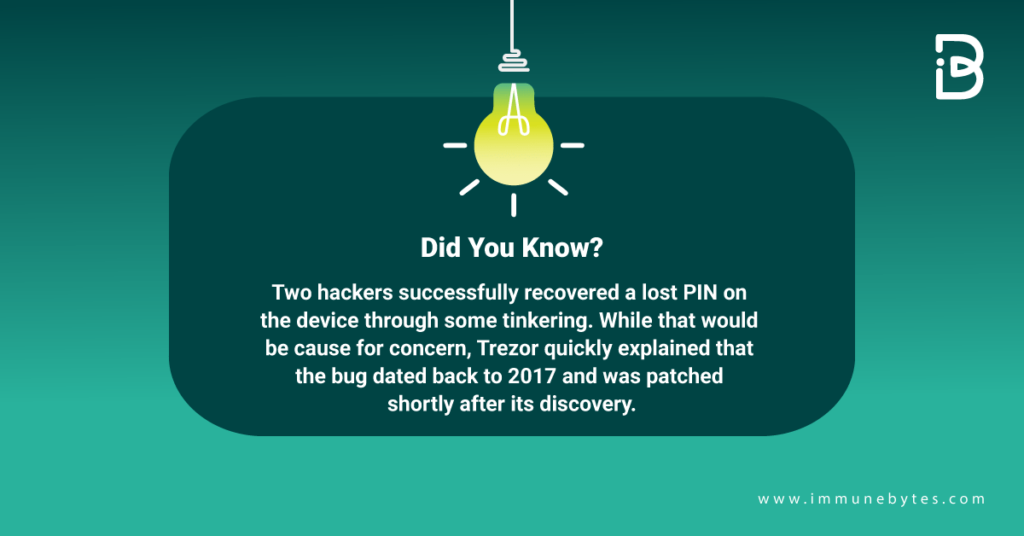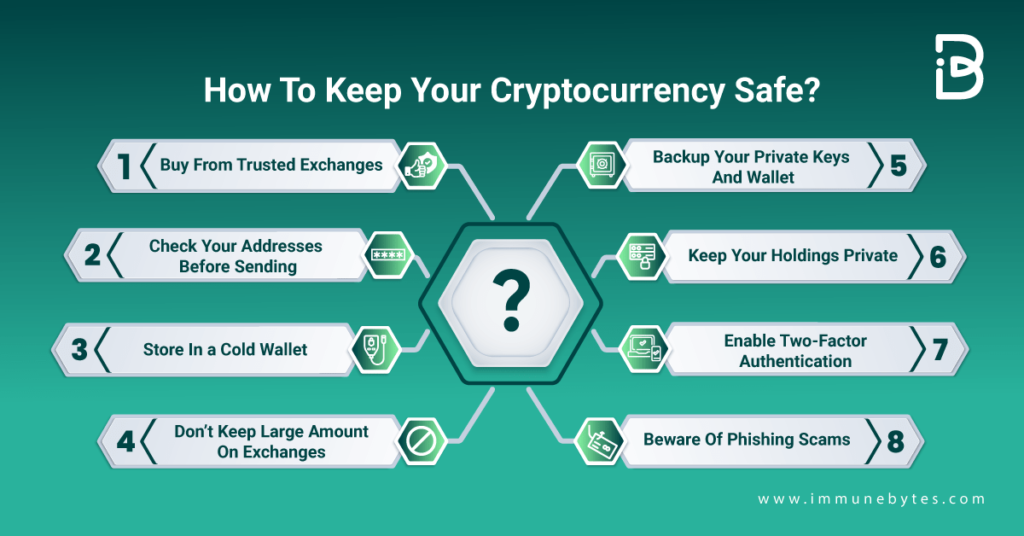A type of cold wallet, the hardware wallet is a type of crypto wallet with which you can easily store your private keys offline. There is no connection to the internet, which is why it is not accessible via an internet connection.
The USB stick is the most popular form of hardware wallet people use nowadays. You can directly plug it into your computer and store your cryptocurrencies. With the advent of technology, newer alternative wallets have come up, like Coolwallet Pro, Ngrave, etc. They look like flash drives and contain preloaded software enabling you to store your cryptos offline safely.
Today, a diverse pool of hardware wallets offer different levels of security; some are more powerful against malware attacks, while others provide additional features like multi-signature functionality.
Some of the most widely used hardware wallets include Ledger Nano X, BtBox, Trezor T, Ellipal, KeepKey, and CoolWallet.
However, just because a hardware wallet isn’t connected to the net, does it mean it cannot be hacked? Are these devices 100% secure? Well, let us find it in this blog. Although the title says it all, let us look at different aspects of the hardware wallets. ImmuneBytes is where all your queries will be answered.
So, let us get started.
Hardware Wallets Are Super Powerful
Table of Contents
- 1 Hardware Wallets Are Super Powerful
- 2 What Makes “Cold Wallets” Superior To “Hot Wallets”?
- 3 Can Hardware Wallets Never Be Hacked?
- 4 How Can You Protect Your Hardware Wallet From Hacking?
- 4.1 Rule 1: Make Sure That You Don?t Tell Anyone Else About Your Private Keys
- 4.2 Rule 2: Don?t Ever Click on the Links That You Get in Emails or Im Messages
- 4.3 Rule 3: Keep your Wallet Seed Carefully So That you Don?t Misplace It
- 4.4 Rule 4: Consider Multi-Sign Cold Storage
- 4.5 Rule 5: Use The 25th Passphrase
- 5 Wrapping Up:?
The internet is overflooded with some amazing reasons as to why users prefer hardware wallets to store their cryptos. They introduce an extra layer of security when it comes to requiring a computer or mobile device connection, and not having any connection with the internet. Private keys are stored locally, hence, people would require credentials to access them.
It might seem to be a little cumbersome to use for some users, but it also provides peace of mind. Users do not need to be concerned about hackers penetrating their computer or mobile device and stealing crypto assets stored in a software wallet. Wallet apps, on the other hand, can communicate with the hardware unit but not directly access funds. Spending money necessitates hardware wallet confirmation and may necessitate extra two-factor verification.
When purchasing a hardware wallet, there is a minimal upfront investment. Several manufacturers supply these items at reasonable costs. A Ledger device starts at 78 euros, whereas the Satochip costs 25 euros. Trezor units (beginning at 69 euros) and SafePal ($50) have never been hacked or implicated in any hack-related allegations.
The hardware wallet market has something for everyone. Users must, however, always be prepared for the responsibilities that come with utilizing these gadgets. This involves appropriately backing up the private keys or seed phrases and ensuring no one can access that data. However, embarking on a self-custody adventure is not without danger.
What Makes “Cold Wallets” Superior To “Hot Wallets”?
“Hot wallet” refers to software and online accounts where users keep cryptos. Kraken, Coinbase, and Binance are some of the exchanges that are hot wallets. Also, software programs or apps like Atomic Wallet, Exodus, and Coinomi are hot wallets.
Hot wallets are usually run by software on a desktop or laptop computer, smartphone, or tablet. This means that your private keys are created and kept in memory on the same device you use to log in to your account.
This makes every hot wallet vulnerable to malicious hacking exploits because stealing funds wouldn’t be tough if someone could access your device.
A cold wallet is different from a hot wallet. Unlike a hardware wallet (cold wallet) that generates and stores your private keys offline, a hot wallet is used to store cryptos online.
Can Hardware Wallets Never Be Hacked?
However cold wallets are safer than hot wallets because they are not connected to the internet, and they are not completely safe too. They store crypto keys offline and keep them susceptible to malware. But hackers have found different types of attacks that could compromise the private keys of your hardware wallet.
Phishing scams are one sort of attack that tries to fool you into giving up your private keys by sending malicious emails that appear to be from renowned sites like Coinbase or Bitfinex. The attacker obtains access to your funds after you input your credentials.
Hackers physically interfering with your hardware wallet is another sort of attack.
There have also been cases of customers receiving fraudulent hardware wallets. These bogus wallets include malware, allowing attackers to steal private keys and drain your accounts.
To escape this situation, always make it a habit to check the device thoroughly before opening it up. Also, without verifying the details of the person, never hand over your private keys to them.

As a result, the “hack” is partially legitimate, if slightly obsolete. Users using older Trezor models, as well as those from Ledger, SafePal, and other manufacturers, should ensure that they upgrade their units on a regular basis. Hardware wallets, like computers and televisions, exist in a variety of forms. To avoid any vulnerabilities in previous versions, it is never a bad idea to upgrade to a newer model after a few years.
How Can You Protect Your Hardware Wallet From Hacking?
Everything around the security of the hardware wallets boils down to managing the private key and seed phrase. The device itself is less crucial. The seed phrase (12 or 24 syllables you obtain when you initially start the hardware wallet) is your true key to your crypto money.

These are some of the ways by which you can protect your hardware wallet from hacking. In most cases, it is observed that crypto losses via hardware wallets are because of the recklessness of the owner, and not a device failure. So, with these rules, you can secure your hardware wallet.
Rule 1: Make Sure That You Don?t Tell Anyone Else About Your Private Keys
At all times, ensure that only you know what your private key is. And even if you are giving access to the private key to someone else, under any circumstance, make sure you have verified his/her details.
You may relax if you have a Coolwallet or Ledger with a Secure Element. Your most sensitive data is saved in the Secure Element and is not accessible to anyone.
CoolWallet and Ledger use secure Elements with the highest certification (CC EAL 5+). It stores sensitive data and functions as a vault. It protects the private key at all times and never discloses it to anybody.
Rule 2: Don?t Ever Click on the Links That You Get in Emails or Im Messages
As an internet user, you may encounter situations in which someone attempts to steal your seed phrase in the following ways:
Phishing Malware:
By clicking on the incorrect link, you may be sent to a bogus website that may fool you into entering your secret phrase or install hidden malware that would intercept your personal information.
Additional Read: What is a Phishing attack?
Impersonating Phishing:
There are so many scammers in the world today who impersonate well-known firms and celebrities in the crypto world. Users fall prey to these scammers and end up sharing their private keys and seed phrases with them.
Rule 3: Keep your Wallet Seed Carefully So That you Don?t Misplace It
It is vital to verify that the wallet seed phrase is valid and secure at all times. Don’t attempt to memorize it, keep it in strange or dangerous places, or play clever tricks with it. Keep it in a dry, secure location, such as a steel wallet or a safe.
Rule 4: Consider Multi-Sign Cold Storage
Multi-signature (multisig) wallets, as the name implies, require more than one set of private keys to sign off on a transaction. This offers an additional degree of protection, especially if one set of private keys is compromised. Wallets like Electrum and services such as Unchained are well-known solutions for implementing a multisig system.
Rule 5: Use The 25th Passphrase
This is equivalent to adding a word to the 25-word Passphrase, for a total of 25 words. This 25th word is not saved on the device and may be used to provide an additional degree of protection to your cold storage device.
Wrapping Up:?
When choosing hardware wallets to store bitcoins, there are several variables to consider. They are, nevertheless, ideal for individuals prepared to take the required precautions to safeguard their funds. That is not to say they cannot be hacked, but it is a highly unlikely scenario.
No wallet solution is completely unhackable; nevertheless, hardware wallets combined with added security safeguards, security features, and best practices provide a robust solution.
So, if you?re wondering if it is possible to hack a cold wallet, then the answer would definitely be yes! However, we can help you secure them. ImmuneBytes hosts a professional panel of experts who spend day and night finding answers to the queries that clients have in their minds. So, what are you waiting for? Get in touch with us today!

